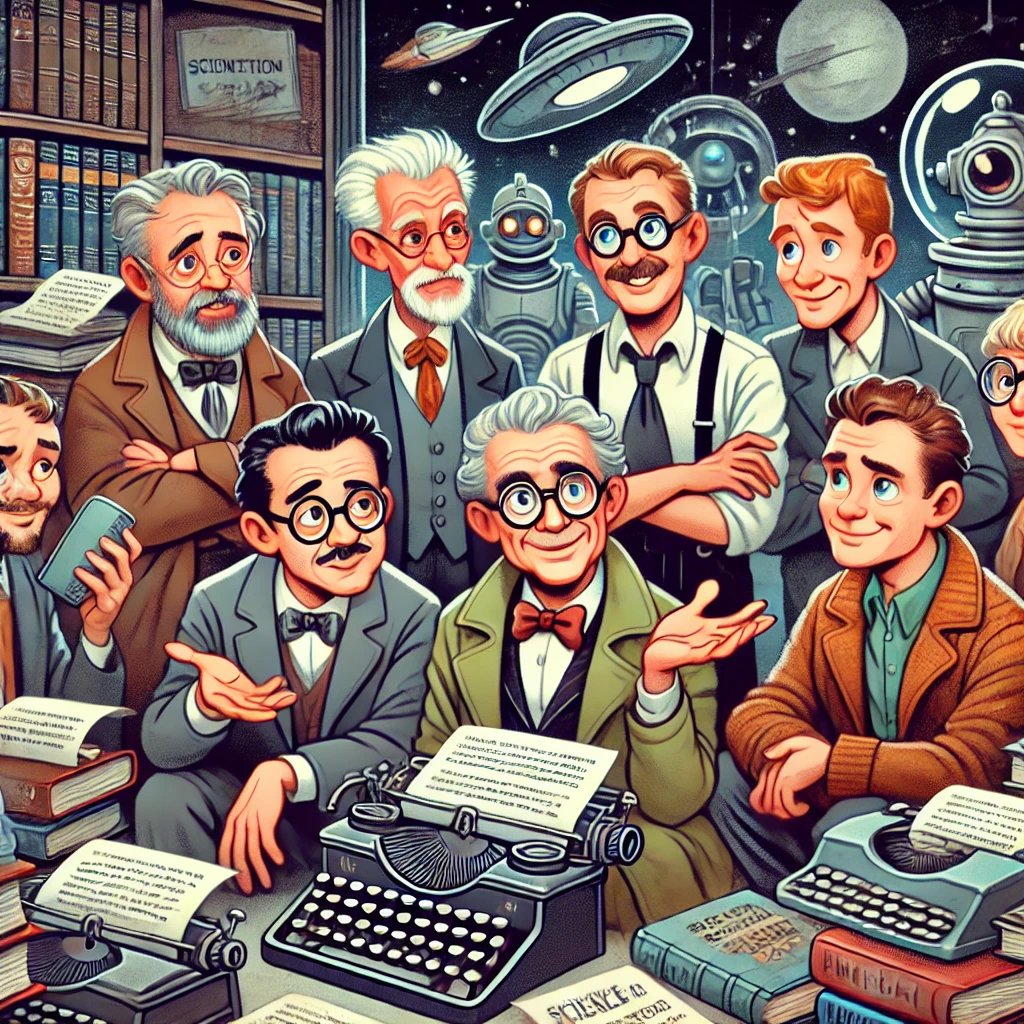News
Classic Science Fiction Authors Who Were Conservative: A Deep Dive

When it comes to science fiction, most people think of wild futuristic ideas, distant galaxies, and societal experimentation. But what many don’t realize is that some of the most iconic figures in classic science fiction were staunch conservatives, holding views that influenced their stories in subtle and significant ways. Today, we’ll explore classic science fiction authors who were conservative, and see how their perspectives shaped the very stories that have captivated readers for decades.
1. Robert A. Heinlein: The Father of Conservative Sci-Fi
If we talk about classic science fiction authors who were conservative, Robert A. Heinlein is undoubtedly at the forefront. Heinlein, known for works like Starship Troopers and The Moon is a Harsh Mistress, had an unmistakable conservative, libertarian influence. He often delved into themes such as individual responsibility, military service, and the idea that freedom comes with a cost.
Starship Troopers, for instance, presents a society where only military veterans are allowed to vote, promoting a clear message about civic duty and the value of contributing to society. Heinlein’s works often glorify individualism and the idea of a government that should exist only to serve its people—not control them. The book is often cited as a favorite among those with conservative or libertarian leanings, due to its portrayal of disciplined societal order and merit-based citizenship.
Heinlein’s perspective also came through in his portrayal of competent, self-sufficient protagonists. These characters embody the spirit of independence and resilience—qualities often celebrated by conservative thinkers. While some readers view Heinlein as controversial, there’s no denying that his views on government, authority, and individual rights have had a profound impact on the genre.
2. Poul Anderson: A Libertarian Conservative Voice
Another notable figure among classic science fiction authors who were conservative is Poul Anderson. Known for his works like Tau Zero and the Technic History series, Anderson was vocal about his libertarian views. Many of his stories emphasize the importance of free enterprise and the dangers of unchecked state power.
Anderson’s fascination with historical settings and themes can also be seen as reflecting a conservative ethos. His novels often highlight the heroics of individual characters standing up against overwhelming odds, sometimes fighting oppressive governments or ideologies. This emphasis on valor, courage, and the dangers of centralized authority has resonated with many readers who hold similar conservative values.
In Anderson’s stories, there is a clear appreciation for cultural continuity and human freedom. His characters value tradition, honor, and liberty, which are themes that recur throughout his work and mark him as one of the key conservative voices in classic science fiction.
3. Jerry Pournelle: Conservative Thinker in Sci-Fi
Jerry Pournelle, often collaborating with Larry Niven, was a prominent figure whose conservative outlook permeated his work. Known for Lucifer’s Hammer and The Mote in God’s Eye, Pournelle’s writing combined hard science fiction with themes of survival, hierarchy, and authority.
Pournelle was not only a novelist but also a political commentator, and his conservative views are evident in his stories, which often feature competent elites guiding humanity through crises. His background in military strategy also influenced his portrayal of the importance of strong leadership, the need for order, and the efficacy of disciplined, well-run societies in the face of chaos.
Lucifer’s Hammer is a vivid example, focusing on how humanity copes after a catastrophic comet strike. The novel presents a grim but ultimately hopeful vision of humanity’s ability to rebuild society, stressing the importance of preparedness and the need for strong leadership during times of crisis—all hallmarks of a conservative worldview.
4. Larry Niven: Pragmatic Libertarian Conservatism
Larry Niven, Pournelle’s frequent collaborator, is also among classic science fiction authors who were conservative. While not as overtly political as some of his peers, Niven’s libertarian conservative leanings come through in his famous Ringworld series and other works set in the Known Space universe.
Niven’s stories often reflect a fascination with the power of technology, yet they also caution against over-reliance on centralized governance. His works present a pragmatic perspective on the limitations of humanity, the need for freedom, and the consequences of societal stagnation. Through his complex world-building, Niven frequently explores how human ingenuity—coupled with limited but effective governance—can help humanity thrive.
His partnership with Jerry Pournelle further helped establish his reputation as a conservative thinker in science fiction. Together, they created gripping narratives that often depicted the triumph of individual resilience, innovative thinking, and the importance of maintaining social order.
5. Frank Herbert: A Complex Conservative Influence
Frank Herbert, best known for his epic Dune series, might not be the first name that comes to mind when thinking of classic science fiction authors who were conservative, but his political and social commentaries reveal a complex set of beliefs that include some conservative undertones. Dune explores themes of leadership, the interplay between religion and politics, and the dangers of centralized power.
While Herbert’s work often criticizes authoritarianism, his portrayal of strong leaders and the emphasis on order and responsibility resonates with conservative ideologies. The Dune universe is one in which chaos is always lurking beneath the surface, and only through wise, often forceful, leadership can stability be maintained. Herbert also admired the resilience of traditional societies, particularly the Fremen, who maintain their culture and values despite outside threats—a theme that aligns with a conservative appreciation for cultural perseverance and resistance to change.
Conservative Themes in Classic Science Fiction
The influence of conservative values in classic science fiction goes beyond the individual authors themselves. Many stories from the golden age of science fiction share certain themes that align with conservative ideals:
- The Value of Discipline and Order: In works like Starship Troopers, Lucifer’s Hammer, and Dune, discipline and societal order are often portrayed as essential to survival and progress. This theme resonates with conservative views on the importance of structure in maintaining a functional society.
- The Heroic Individual: A recurrent theme among these authors is the importance of the individual hero, whose courage, intelligence, and values often change the course of history. This aligns with conservative beliefs about personal responsibility, self-reliance, and the potential of individuals to impact the world.
- Skepticism of Centralized Power: Many classic science fiction authors who were conservative exhibited a deep skepticism of centralized power and unchecked authority. From Heinlein’s disdain for excessive government control to Anderson’s portrayal of oppressive states, these authors expressed concerns about the dangers of centralized power and championed the rights of individuals.
Why Understanding Their Perspectives Matters
Recognizing the conservative backgrounds of these classic science fiction authors provides readers with a deeper understanding of the motivations and themes within their works. Their political views often shaped the way they imagined societies, government structures, and the challenges of human survival.
While science fiction is often considered a genre of progressive thought, the contributions of conservative authors show that there’s a diversity of perspectives even within speculative literature. This interplay of ideas—liberal, conservative, and everything in between—is part of what makes classic science fiction such a rich and rewarding genre to explore.
Conclusion
The influence of classic science fiction authors who were conservative cannot be understated. Figures like Robert A. Heinlein, Poul Anderson, Jerry Pournelle, Larry Niven, and Frank Herbert brought their values and beliefs into their writing, producing stories that have continued to resonate with readers across the political spectrum. Their works offer an exploration of individualism, skepticism of power, and the importance of leadership and discipline—themes that are as relevant today as they were when these stories were first written.
Whether you align with their beliefs or not, these authors provide compelling narratives that challenge readers to think critically about society, governance, and human nature. Their conservative perspectives add a unique dimension to the science fiction genre, one that continues to inspire debate, reflection, and admiration among fans worldwide.
FAQs
1. What is the significance of conservative views in classic science fiction?
Conservative views in classic science fiction bring a unique perspective to themes like governance, individual responsibility, and societal order. They often emphasize the importance of discipline, leadership, and skepticism toward centralized authority, which adds depth and diversity to the genre.
2. Are all classic science fiction authors conservative?
No, classic science fiction features a wide range of political ideologies, from progressive to conservative. Authors like Isaac Asimov and Arthur C. Clarke are known for their more progressive views, while others like Heinlein and Pournelle represent conservative thought.
3. How do conservative themes in science fiction differ from progressive themes?
Conservative themes in science fiction often emphasize order, tradition, and individual heroism, whereas progressive themes might focus more on social change, equality, and utopian visions. Both perspectives offer valuable insights into the human condition and possible futures.
